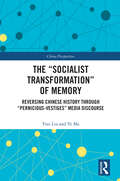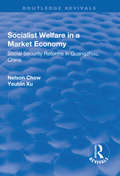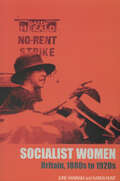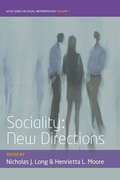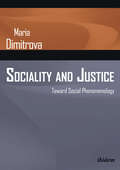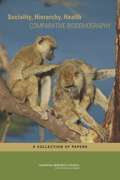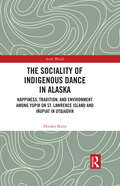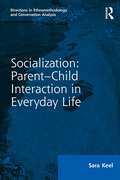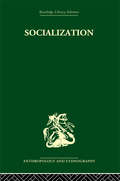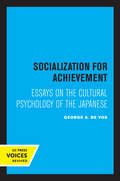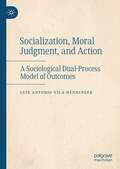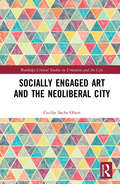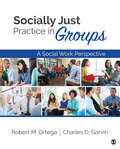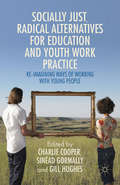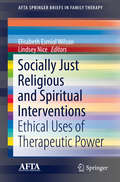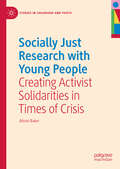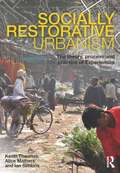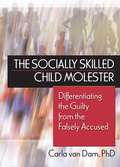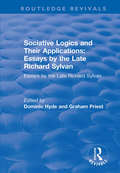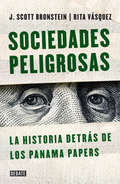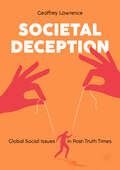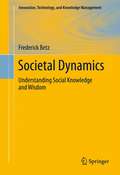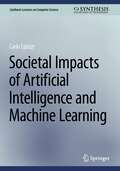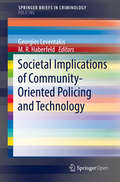- Table View
- List View
The “Socialist Transformation” of Memory: Reversing Chinese History through “Pernicious-Vestiges” Media Discourse (China Perspectives)
by Yusi Liu Ye MaThrough discourse analysis and historical comparison of "Pernicious Vestiges" (Yí Dú/遗毒) narrative in the news text of People’s Daily, this book is devoted to revealing its primary metaphors and political functions in China. "Pernicious Vestiges" (Yí Dú/遗毒) is one of the most frequently used words in contemporary Chinese historical narration, as well as a constantly changing rhetorical direction in new China's media discourse, whose function is to remold memory. Over the past 76 years, the "Pernicious Vestiges" narrative continuously constructed by People’s Daily, the official newspaper of the CPC Central Committee, reflects the views of China’s political elite and represents the ruling party's evaluation and re-evaluation of historical events. The findings of this book challenge the myth that memory is naturally superior to forgetting, reflect on the ethics of memory in "Pernicious Vestiges" narratives and the erasure of their own justice, and suggest that the critical space compressed by "Pernicious Vestiges" narratives should be returned to restore the order of memory and historical reflection. This book will be an excellent read for students and scholars of Chinese studies, media studies, and those who are interested in political communication and collective memory in general.
Socialist Welfare in a Market Economy: Social Security Reforms in Guangzhou, China
by Yongxin Zhou Nelson Chow Yeubin XuThis title was first published in 2001. Using the city of Guangzhou as a case study, this text looks at how China has adopted a market economy, whilst still maintaining state-owned enterprises and an all-embracing social security system which protects the majority of Chinese workers. This volume examines three questions: can socialist social welfare co-exist with the market economy?; can state-owned enterprises survive in a market economy?; and has China succeeded in creating a market economy without sacrificing its socialist ideals? The study demonstrates that compromises have been necessary to accomodate both socialist and market objectives. continuing to support workers with social security benefits has, for example, made enterprises less competitive, and disparities in benefits arise as workers are allowed to supplement the minimum guaranteed income through savings in individual accounts.
Socialist Women: Britain, 1880s to 1920s
by June Hannam Karen HuntThis fascinating new study examines the experiences of women involved in the socialist movement during its formative years in Britain and the active role they played in campaigning for the vote. By giving full attention to this much-neglected group of women, Socialist Women examines and challenges the orthodox views of labour and suffrage history. Torn between competing loyalties of gender, class and politics, socialist women did not have a fixed identity but a number of contested identities. June Hannam and Karen Hunt probe issues that created divisions between these women, as well as giving them the opportunity to act together. In three fascinating case studies they explore:* women's suffrage* women and internationalism* the politics of consumption.Believing above all that being a woman was vital to their politics, these individuals sought to develop a woman-focused theory of socialism and to put this new politics into practice.
Sociality
by Nicholas J. Long Henrietta L. MooreThe notion of 'sociality' is now widely used within the social sciences and humanities. However, what is meant by the term varies radically, and the contributors here, through compelling and wide ranging essays, identify the strengths and weaknesses of current definitions and their deployment in the social sciences. By developing their own rigorous and innovative theory of human sociality, they re-set the framework of the debate and open up new possibilities for conceptualizing other forms of sociality, such as that of animals or materials. Cases from Asia, Africa, the Americas and Europe explore the new directions of human sociality, illuminating how and why it is transformed when human beings engage with such major issues as economic downturn, climate change, new regimes of occupational and psychological therapy, technological innovations in robotics and the creation of new online, 'virtual' environments. This book is an invaluable resource, not only for research and teaching, but for anyone interested in the question of what makes us social.
Sociality and Justice: Toward Social Phenomenology
by Maria DimitrovaBuilding on the work of Emmanuel Levinas, this groundbreaking book puts the phenomenological paradigm into a new perspective. Overcoming the focus on self-reflection of the thinking subject and instead arguing for the importance of sociality as responsibility for the Other, this new approach is based on inter-subjectivity and introduces a social dimension in phenomenology. This also allows for a different interpretation of the notion of justice, which in this context sits in the space between the one, the other, and the third before settling into any relation to the law. In the vast area inhabited by more or less distant others, moral responsibility is implemented through the establishment and maintenance of just institutions.
Sociality, Hierarchy, Health: Comparative Biodemography
by Maxine WeinsteinSociality, Hierarchy, Health: Comparative Biodemography is a collection of papers that examine cross-species comparisons of social environments with a focus on social behaviors along with social hierarchies and connections, to examine their effects on health, longevity, and life histories. This report covers a broad spectrum of nonhuman animals, exploring a variety of measures of position in social hierarchies and social networks, drawing links among these factors to health outcomes and trajectories, and comparing them to those in humans. Sociality, Hierarchy, Health revisits both the theoretical underpinnings of biodemography and the empirical findings that have emerged over the past two decades.
The Sociality of Indigenous Dance in Alaska: Happiness, Tradition, and Environment among Yupik on St. Lawrence Island and Iñupiat in Utqiaġvik (Arctic Worlds)
by Hiroko IkutaThis book explores indigenous dances and social relationships surrounding the dance activities among Yupik on St. Lawrence Island and Iñupiat in Utqiaġvik, Northern Alaska. Yupik and Iñupiat proudly distinguish their indigenous styles of dance, locally called ‘Eskimo dance’, from Western styles of dance, such as ballroom, disco or ballet. Based on two years of intensive fieldwork and 18 years of experience living in Alaska, Ikuta sets out to understand how Yupik and Iñupiaq dances are at the centre of social relationships with the environment, among humans, between humans and animals, and between Native and the Euro-American societies. It also examines how the nature and structure of dance are connected to cultural politics, wrought by political, economic and historical events.
Socialization: Parent-child Interaction In Everyday Life (Directions in Ethnomethodology and Conversation Analysis)
by Sara KeelAdopting a conversation analytic approach informed by ethnomethodology, this book examines the process of socialization as it takes place within everyday parent–child interactions. Based on a large audio-visual corpus featuring footage of families filmed extensively in their homes, the author focuses on the initiation of interactive assessment sequences on the part of young children with their parents and the manner in which, by means of embodied resources, such as talk, gaze, and gesture, they acquire communicative skills and a sense of themselves as effective social actors. With attention to the responses of parents and their understanding of their children's participation in exchanges, and the implications of these for children's communication this book sheds new light on the ways in which parents and children achieve shared understanding, how they deal with matters of 'alignment' or 'disalignment' and issues related to their respective membership categories. As a rigorous and detailed study of children's early socialization as well as the structural and embodied organization of communicative sequences, Socialization: Parent–Child Interaction in Everyday Life will appeal to scholars of sociology and child development with interests in ethnomethodology and conversation analysis, early years socialization and the sociology of family life.
Socialization: The approach from social anthropology
by Philip MayerThis volume represents the first major effort to apply the distinctive techniques of British social anthropology to the subject of socialization. Along with methodological and theoretical discussion, there is a variety of new field material from Africa, Southeast Asia and elsewhere. First published in 1967.
Socialization for Achievement: Essays on the Cultural Psychology of the Japanese (Center for Japanese Studies, UC Berkeley)
by George A. De VosThis title is part of UC Press's Voices Revived program, which commemorates University of California Press’s mission to seek out and cultivate the brightest minds and give them voice, reach, and impact. Drawing on a backlist dating to 1893, Voices Revived makes high-quality, peer-reviewed scholarship accessible once again using print-on-demand technology. This title was originally published in 1973.
Socialization, Moral Judgment, and Action: A Sociological Dual-Process Model of Outcomes
by Luis Antonio Vila-HenningerHow does culture affect action? This question has long been framed in terms of a means vs ends debate—in other words, do cultural ends or cultural means play a primary causal role in human behavior? However, the role of socialization has been largely overlooked in this debate. In this book, Vila-Henninger develops a model of how culture affects action called “The Sociological Dual-Process Model of Outcomes” that incorporates socialization. This book contributes to the debate by first providing a critical overview of the literature that explains the limitations of the sociological dual-process model and subsequent scholarship—and especially work in sociology on “schemas”. It then develops a sociological dual-process model of moral judgment that formally explains Type I processes, Type II processes, and the interaction between Type I and Type II processes. The book also expands sociological dual-process models to include a temporal dimension—the "Sociological Dual-Process Model of Outcomes". Finally, the book integrates a theory of socialization into the sociological dual-process model and creates empirical indicators that confirm Vila-Henninger’s theorization and contribute to the literature on measures of dual-process models.
Socially Engaged Art and the Neoliberal City (Routledge Critical Studies in Urbanism and the City)
by Cecilie Sachs OlsenWhat are the social functions of art in the age of neoliberal urbanism? This book discusses the potential of artistic practices to question the nature of city environments and the diverse productions of space, moving beyond the reduction of ‘the urban’ as a set of existing and static structures. Adopting a practice-led approach, each chapter discusses case studies from across the world, reflecting on personal experiences as well as the work of other artists. While exposing the increasingly limiting constraints placed on public and socially engaged art by the dominance of commercial funding and neoliberal frameworks, the author stays optimistic about the potential of artistic practices to transcend neoliberal logics through alternative productions of space. Drawing upon a Lefebvrian framework of spatial practice and using a structuralist approach to challenge neoliberal structures, the book draws links between art, resistance, criticism, democracy, and political change. The book concludes by looking at how we might create a new course for socially engaged art within the neoliberal city. It will be of great interest to researchers in urban studies, urban geography, and architecture, as well as students who want to learn more about place-making, visual culture, performance theory, applied practice, and urban culture.
Socially Just Practice in Groups: A Social Work Perspective
by Charles D. Garvin Dr Robert M. OrtegaSocially Just Practice in Groups: A Social Work Perspective comprehensively covers all aspects of group practice in social work settings, integrating a unique social justice framework throughout. Drawing from their experience as group work practitioners, authors Robert Ortega and Charles D. Garvin walk readers through the basics of group practice, including getting started, doing group work, establishing the purpose, roles and tasks of the group, stages and phases of practice, and specific skills in assessment, monitoring, and evaluation. A social justice framework provides a fresh perspective during an era of widespread social change and provides social workers tools for effective group interventions. Chapters contain detailed case examples to illustrate concepts presented, as well as exercises to help students practice skills.
Socially Just Practice in Groups: A Social Work Perspective
by Charles D. Garvin Dr Robert M. OrtegaSocially Just Practice in Groups: A Social Work Perspective comprehensively covers all aspects of group practice in social work settings, integrating a unique social justice framework throughout. Drawing from their experience as group work practitioners, authors Robert Ortega and Charles D. Garvin walk readers through the basics of group practice, including getting started, doing group work, establishing the purpose, roles and tasks of the group, stages and phases of practice, and specific skills in assessment, monitoring, and evaluation. A social justice framework provides a fresh perspective during an era of widespread social change and provides social workers tools for effective group interventions. Chapters contain detailed case examples to illustrate concepts presented, as well as exercises to help students practice skills.
Socially Just, Radical Alternatives for Education and Youth Work Practice: Re-Imagining Ways of Working with Young People
by Charlie Cooper Sin�ad Gormally Gill HughesChallenging dominant discourses in neoliberal marketized societies about working with disconnected young people, this book argues that alternative, radical approaches to formal and informal education are necessary to challenge repressive practices, and to help build a more equal, socially-just society.
Socially Just Religious and Spiritual Interventions: Ethical Uses of Therapeutic Power (AFTA SpringerBriefs in Family Therapy)
by Elisabeth Esmiol Wilson Lindsey NiceThis insightful work answers essential questions in family therapy by exploring the ethical use of religion and spirituality in the clinical context. Its justice-informed framework explores how to employ the spiritual as a source of resilience and empowerment as well as counter harmful spiritual and religious influences in situations that cause families and couples stress, particularly relating to gender, sexuality, race, culture, and identity. Powerful case studies show therapists and clients collaborating on meaning-making and comfort in the face of longstanding conflict, acute and chronic illness, estrangement, and loss. Coverage also explores the ethical responsibilities of determining whether beliefs are helpful or harmful to client mental health and offers guidelines for therapists navigating personal biases regarding faith. This vital text:· Spotlights the influence of an often-overlooked aspect of mental health· Provides detailed examples of religion and spirituality across diverse families and issues· Outlines practical strategies for integrating helpful aspects of clients’ relationship with the sacred into treatment· Offers a framework for countering harmful aspects of clients’ religious beliefs or practices· Includes interventions used with couples, parents/children, and other family units· Adds a socially just perspective on the spiritual dimension of mind/body concerns· Encourages readers’ professional development and self-reflection Addressing critical issues where belief frequently takes center stage, Socially Just Religious and Spiritual Interventions is an invaluable resource for family therapists, psychotherapists, and other professionals pursuing a socially just, clinically relevant approach to spiritual and religious therapeutic integration.
Socially Just Research with Young People: Creating Activist Solidarities in Times of Crisis (Studies in Childhood and Youth)
by Alison BakerThis book bridges the fields of critical youth studies, community psychology, and sociology to offer a transdisciplinary analysis of youth voice, participation, and activism, as well as of creative and inclusive knowledge-making practices. Presented in three parts, the book traces our journey of praxis as we documented the narratives and testimonies of young people and then mobilised this knowledge to co-imagine and co-create a Youth Participatory Action Research (YPAR) collective aimed at fostering connection and healing during the stringent lockdowns of 2020 in Victoria, Australia. Community building and art-making became central to memorialising their experiences of grief and loss, whilst also opening up new ways of seeing, being and doing. With no end in sight to our current coalescence of crises, this book serves as an invitation to those working alongside young people to consider what we must carry with us if we are to reimagine and remake our world.
Socially Restorative Urbanism: The theory, process and practice of Experiemics
by Kevin Thwaites Alice Mathers Ian SimkinsThe need for a human-orientated approach to urbanism is well understood, and yet all too often this dimension remains lacking in urban design. In this book the authors argue for and develop socially restorative urbanism – a new conceptual framework laying the foundations for innovative ways of thinking about the relationship between the urban spatial structure and social processes to re-introduce a more explicit people-centred element into urban place-making and its adaptation. Focusing on this interplay between humans and the built environment, two new concepts are developed: the transitional edge – a socio-spatial concept of the urban realm; and Experiemics – a participative process that acts to redress imbalances in territorial relationships, defined in terms of the awareness of mine, theirs, ours and yours (MTOY). In this way, Socially Restorative Urbanism shows how professional practice and community understanding can be brought together in a mutually interdependent and practical way. Its theoretical and practical principles are applicable across a wide range of contexts concerning human benefit through urban environmental change and experience, and it will be of interest to readers in the social sciences and environmental psychology, as well as the spatial planning and design disciplines.
The Socially Skilled Child Molester: Differentiating the Guilty from the Falsely Accused
by Carla Van DamKnow what signs indicate a child molester!Revealing the secret but successful strategies used by child molesters allows adults to intervene long before children are abused. The Socially Skilled Child Molester: Differentiating the Guilty from the Falsely Accused identifies how socially proficient molesters successfully ingratiate themselves into families and communities. The book closely examines their techniques and strategies while detailing the tools for prevention. The difficult issue of false accusation is tackled by learning the distinctions that clearly differentiate the actions of the guilty from those who are innocent. Practical recommendations for accurately assessing danger and managing safety are provided. The Socially Skilled Child Molester focuses on the sexual deviants who 'groom' family, friends, and their community to allow their activities, though arousing suspicion, to go on without restriction. This essential source reveals their tactics. Using composite representations of various types of child molesters, the author illustrates through case history and detailed research how these offenders succeed, while providing recommendations on how communities can stop enabling and protecting such individuals. The Socially Skilled Child Molester discusses in depth: ’groomers’ versus ’grabbers’ common misperceptions about child molesters the groomer profile—the different types groomer strategies for manipulation correctly differentiating between pedophiles and the falsely accused predicting risk the key concerns when interviewing child molesters the three levels of child molesters recidivism for the sexual deviant. The Socially Skilled Child Molester comprehensively brings together helpful strategies and vital information essential for parents, lawmakers, police, teachers, and therapists.
Sociative Logics and Their Applications: Essays by the Late Richard Sylvan (Routledge Revivals)
by Dominic Hyde Graham PriestThis title was first published in 2003. Richard Sylvan died in 1996, he had made contributions to many areas of philosophy, such as, relevant and paraconsistent logic, Meinongianism and metaphysics and environmental ethics. One of his "trademarks" was the taking up of unpopular views and defending them. To Richard Sylvan ideas were important, wether they were his or not. This is a book of ideas, based on a collection of work found after his death, a chance for readers to see his vision of his projects. This collected works represents material drafted between 1982 and 1996, and the theme is that a small band of logics, namely pararelevant logics, offer solutions to many problems, puzzles and paradoxes in the philosophy of science.
Sociedades peligrosas. La historia de los Panama Papers: La historia detrás de los Panamá Papers
by Rita Vasquez Scott BronsteinRita Vásquez y J. Scott Bronstein, miembros de La Prensa, único medio de Panamá involucrado en la investigación de los Panama Papers, nos descubren los entretelones de esta operación periodística, que ha recibido el Premio Pulitzer 2017. Al estilo de un thriller policiaco, no faltan las desapariciones, sabotajes y amenazas que vivieron funcionarios y periodistas que estuvieron cerca de los clientes de la firma y de las investigaciones. ¿Por qué el abogado Jürgen Mossak -hijo de un oficial nazi- intenta disuadir a los directivos de La Prensa de que continúen con la indagación que involucra a su firma con procedimientos financieros presuntamente ilícitos? ¿De qué manera operaba el bufete para ofrecer sus servicios a clientes que, en ocasiones, resultaron ser criminales? ¿Cómo se montó la filtración masiva que llevó a descubrir el entramado? ¿Quiénes estaban interesados en que se dieran a conocer los nombres de cientos de personajes con capitales en paraísos fiscales? Si, al parecer, había interés en llegar hasta el fondo de la investigación, ¿por qué los autores tuvieron que hacer frente a la pérdida de amistades y relaciones profesionales? ¿Se sintieron amenazados estos periodistas? ¿Por qué Panamá fue señalado desde fuera y desde dentro? Los autores vieron también peligrar su seguridad. El caso terminaría enfrentando no sólo a Panamá contra el mundo, sino también a los panameños entre sí, aunque los autores reivindican a lo largo de las páginas a un país, el suyo. Ésta es una historia de múltiples sociedades, muchas de ellas sociedades peligrosas.
Societal Deception: Global Social Issues in Post-Truth Times
by Geoffrey LawrenceThis book provides a comprehensive overview of ‘societal deception’ - how and why people are deceived and led to believe fake news. Coherently blending critical political economy and sociology, the author provocatively examines how corporations, political parties, the media, think tanks and assorted 'influencers' seek to manipulate public opinion to achieve their goals. This book spans an array of contemporary topics and issues not normally tackled by a single writer – the media, genetic engineering, fast food, environmental pollution, climate change, economic inequality, political manipulations, sports, and religion. While critical in subject matter, and replete with easily accessible and reliable sources, this book is highly readable and entertaining for the general as well as academic audience interested in current global issues.
Societal Dynamics
by Frederick BetzAt both a micro-information level and a macro-societal level, the concepts of "knowledge" and "wisdom" are complementary - in both decisions and in social structures and institutions. At the decision level, knowledge is concerned with how to make a proper choice of means, where "best" is measured as the efficiency toward achieving an end. Wisdom is concerned with how to make a proper choice of ends that attain "best" values. At a societal level, knowledge is managed through science/technology and innovation. And while science/technology is society's way to create new means with high efficiencies, they reveal nothing about values. Technology can be used for good or for evil, to make the world into a garden or to destroy all life. It is societal wisdom which should influence the choice of proper ends -- ends to make the world a garden. How can society make progress in wisdom as well as knowledge? Historically, the disciplines of the physical sciences and biology have provided scientific foundations for societal knowledge But the social science disciplines of sociology, economics, political science have not provided a similar scientific foundation for societal wisdom. To redress this gap, Frederick Betz examines several cases in recent history that display a fundamental paradox between scientific/technological achievement with devastating social effects (i.e., historical events of ideological dictatorships in Russia, Germany, China, and Yugoslavia). He builds a new framework for applying social science perspectives to explain societal histories and social theory. Emerging from this methodological and empirical investigation is a general topological theory of societal dynamics. This theory and methodology can be used to integrate history and social science toward establishing grounded principles of societal wisdom.
Societal Impacts of Artificial Intelligence and Machine Learning (Synthesis Lectures on Computer Science)
by Carlo LipizziThis book goes beyond the current hype of expectations generated by the news on artificial intelligence and machine learning by analyzing realistic expectations for society, its limitations, and possible future scenarios for the use of this technology in our current society. Artificial Intelligence is one of the top topics today and is inflating expectations beyond what the technology can do in the foreseeable future. The future cannot be predicted, but the future of some elements of our society, such as technology, can be estimated. This book merges the modeling of human reasoning with the power of AI technology allowing readers to make more informed decisions about their personal or financial decisions or just being more educated on current technologies. This book presents a model that sketches potential future scenarios based on a discussion of the expectations today, the analysis of the current gap in the literature, and a view of possible futures in terms of technology and use cases. Specifically, this book merges literature on the technology aspects, the sociological impacts, and philosophical aspects.
Societal Implications of Community-Oriented Policing and Technology (SpringerBriefs in Criminology)
by M. R. Haberfeld Georgios LeventakisThis Brief presents new approaches and innovative challenges to address bringing technology into community-oriented policing efforts. “Community-oriented policing” is an approach that encourages police to develop and maintain personal relationships with citizens and community organizations. By developing these partnerships, the goal is to enhance trust and legitimacy of police by the community (and vice versa), and focus on engaging the community crime prevention and detection efforts for sustainable, long-term crime reduction.The contributions to this volume emphasize the societal implications of new technologies for community-oriented policing goals, such as: -Strengthening community policing principles through strengthed community feeling and lower feeling of insecurity - Reducing the fear of crime and enhancing the perception of security in large, urban environments -Enhancing citizens feelings' of empowerment, belonging, and collective efficacy Contributions to this volume were developed out of the Next Generation Community Policing (NGCP) International Conference was co-organized by nine contributing research and development projects, funded by the Horizon 2020 SECURITY Program of the European Commission. It will be of interest to researchers in criminology and criminal justice, as well as related fields such as sociology, public health, security, IT and public policy.
